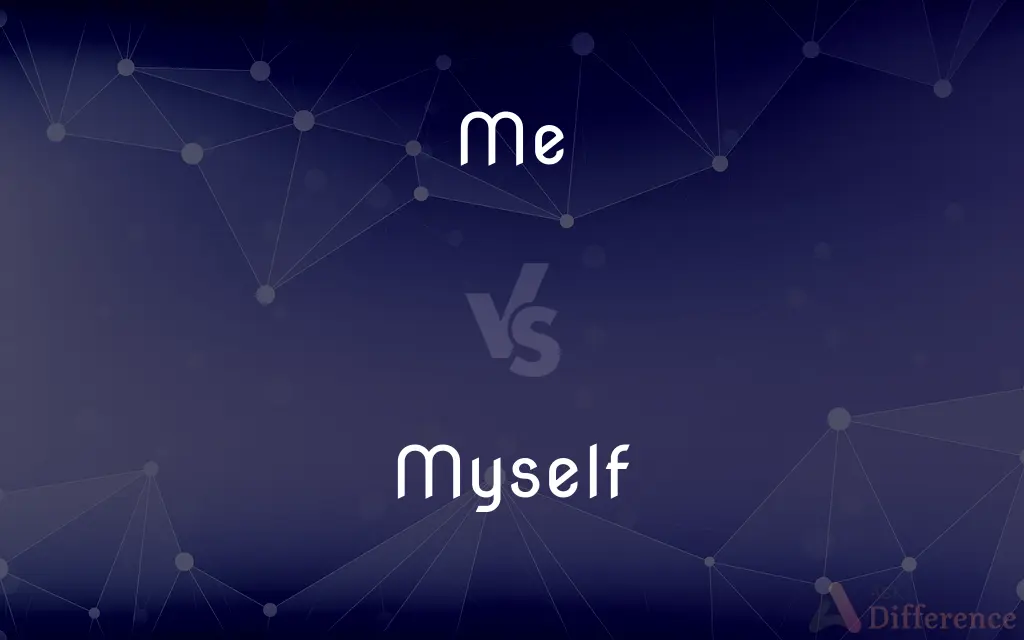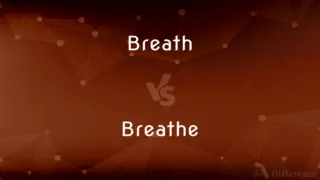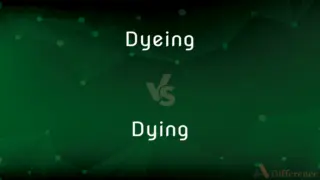Me vs. Myself — What's the Difference?
Edited by Tayyaba Rehman — By Fiza Rafique — Updated on October 12, 2023
"Me" is an objective pronoun used as a direct/indirect object, while "Myself" is a reflexive pronoun indicating the subject's action affects the subject.

Difference Between Me and Myself
Table of Contents
ADVERTISEMENT
Key Differences
Both "Me" and "Myself" are pronouns used in English, but they have different functions within a sentence. Me is an objective pronoun, meaning it is used as a direct or indirect object in a sentence or after a preposition. For example, "She gave the book to me." In this sentence, "me" is the recipient of the action. On the other hand, Myself is a reflexive pronoun used when the subject and the object of the verb are the same, or when emphasizing the subject.
The word Me often finds its place in sentences where the action is being done to the speaker. It's straightforward, without the introspective depth that "myself" can sometimes introduce. Myself is used when the action of the verb returns to the doer, as in "I hurt myself," where the action (hurt) is both performed and received by the subject (I).
Many times, people mistakenly use "myself" in places where "me" would be grammatically correct. For example, saying "The boss spoke to John and myself" is incorrect. The correct form would be "The boss spoke to John and me." However, if one were to say, "I did the task myself," it emphasizes that the person undertook the task without assistance.
In essence, while Me is often on the receiving end of actions or used after prepositions, Myself emphasizes an action's return to the doer or stresses the doer's role. Knowing when to use each can enhance both written and spoken communication.
Comparison Chart
Pronoun Type
Objective
Reflexive
ADVERTISEMENT
Function in Sentence
Serves as direct/indirect object
Indicates subject's action affects subject or for emphasis
Example of Use
"She told me a story."
"I did it myself."
Position in Sentence
Can appear almost anywhere
Usually close to the subject
Common Mistake
—
Incorrectly used in place of "me"
Compare with Definitions
Me
Used in comparisons after "as" or "than".
No one knows better than me.
Myself
Reflexive form of the first-person singular pronoun.
I hurt myself.
Me
Used to emphasize the speaker's role in an action.
Me, I prefer coffee over tea.
Myself
Used in absolute constructions.
Myself a teacher, I understand the challenge.
Me
Objective form of the first-person singular pronoun.
She gave me the book.
Myself
To indicate the subject's action affects the subject.
I blame myself for the mistake.
Me
Used by a speaker to refer to themselves as the object of a verb or preposition.
They are coming with me.
Myself
Used for emphasis to highlight the subject's role in an action.
I made it all by myself.
Me
Used by a speaker to refer to himself or herself as the object of a verb or preposition
Do you understand me?
Wait for me!
Myself
Used for stress in comparisons.
I'd rather do it myself.
Me
Used in exclamations
Dear me!
Myself
Used by a speaker to refer to himself or herself as the object of a verb or preposition when he or she is the subject of the clause
I strolled around, muttering to myself
I hurt myself by accident
Me
A medical condition of unknown cause, with fever, aching, and prolonged tiredness and depression, typically occurring after a viral infection.
Myself
I or me personally (used to emphasize the speaker)
I myself am unsure how this problem should be handled
I wrote it myself
Me
As the direct object of a verb.
Can you hear me?
Myself
Used by a speaker to refer to himself or herself; I
Myself presented to him a bronze sword
Me
Myself; as a reflexive direct object of a verb.
Myself
(reflexive pronoun) Me, as direct or indirect object the speaker as the object of a verb or preposition, when the speaker is also the subject.
I taught myself.
Me
As the object of a preposition.
Come with me.
Myself
Personally, for my part; used in apposition to I, sometimes for simple emphasis and sometimes with implicit exclusion of any others performing the activity described.
Me
As the indirect object of a verb.
He gave me this.
Myself
In my normal state of body or mind.
Me
Myself; as a reflexive indirect object of a verb; the ethical dative.
Myself
Me (as the object of a verb or preposition).
I feel like myself.
Me
As the complement of the copula (be or is).
It wasn't me.
Myself
(archaic) I (as the subject of a verb).
Me
As the subject of a verb.
Me and my friends played a game.
Myself
My name is...
Myself John.
Me
As the subject of a verb.
Myself
I or me in person; - used for emphasis, my own self or person; as I myself will do it; I have done it myself; - used also instead of me, as the object of the first person of a reflexive verb, without emphasis; as, I will defend myself.
Me
(music) The solfeggio syllable used to indicate the flat of the third note of a major scale.
Me
The person speaking, regarded as an object; myself; a pronoun of the first person used as the objective and dative case of the pronoum I; as, he struck me; he gave me the money, or he gave the money to me; he got me a hat, or he got a hat for me.
Me rather had my heart might frrl your loveThan my unpleased eye see your courtesy.
Me
A state in New England
Me
Used in exclamations to express surprise or disbelief.
Little old me? Surely not!
Common Curiosities
Can Me and Myself both be subjects?
No, "I" is the subject form. "Me" is an object, and "myself" is reflexive or emphatic.
When should I use Me in a sentence?
Use "me" as a direct or indirect object or after a preposition.
Can Myself be used for emphasis?
Yes, "myself" can emphasize the subject's role in an action.
Is "I myself" redundant?
It can be, but it's often used for emphasis.
Is saying "The gift is for you and myself" correct?
No, it should be "The gift is for you and me."
How can I remember when to use Myself?
Think of actions affecting the doer or when emphasizing the doer's role.
Why is "I did it myself" correct?
Here, "myself" emphasizes that the action was done without assistance.
Are Me and Myself interchangeable?
No, "me" is an objective pronoun, while "myself" is reflexive or used for emphasis.
Can "me" start a sentence?
While uncommon, it's possible for emphasis, e.g., "Me, I prefer jazz."
Is "between you and me" the correct phrase?
Yes, "between you and me" is correct, not "between you and myself."
Can Myself be used after prepositions?
Not typically. For example, "for me" is correct, not "for myself."
Is "Me too" the right response to someone's statement?
Yes, "Me too" is colloquially used to say one feels the same way.
Do other pronouns have reflexive forms like Myself?
Yes, e.g., himself, herself, themselves.
Share Your Discovery

Previous Comparison
Breath vs. Breathe
Next Comparison
Dyeing vs. DyingAuthor Spotlight
Written by
Fiza RafiqueFiza Rafique is a skilled content writer at AskDifference.com, where she meticulously refines and enhances written pieces. Drawing from her vast editorial expertise, Fiza ensures clarity, accuracy, and precision in every article. Passionate about language, she continually seeks to elevate the quality of content for readers worldwide.
Edited by
Tayyaba RehmanTayyaba Rehman is a distinguished writer, currently serving as a primary contributor to askdifference.com. As a researcher in semantics and etymology, Tayyaba's passion for the complexity of languages and their distinctions has found a perfect home on the platform. Tayyaba delves into the intricacies of language, distinguishing between commonly confused words and phrases, thereby providing clarity for readers worldwide.















































